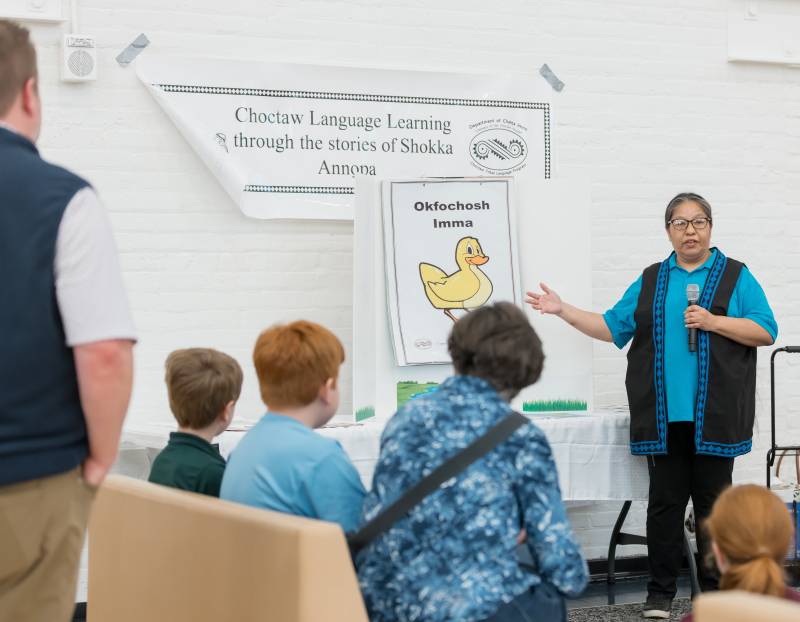³Ô¹ÏºÚÁÏÍø researchers seek best practices to preserve, revitalize native Choctaw language

The Choctaw language is more than a method of communication; for Choctaws in ³Ô¹ÏºÚÁÏÍø, it is a rich, vibrant link to their ancestors that is central to their identity. The language serves to promote the tribe’s history, culture and sovereignty.
In coordination with the ³Ô¹ÏºÚÁÏÍø Band of Choctaw Indians, a multidisciplinary team of ³Ô¹ÏºÚÁÏÍø faculty from the schools of Business, Communication and Modern Languages is studying the K-12 teaching methods of the Choctaw language (Chahta Annopa) and Choctaw culture (Chahta Immi) in the MBCI’s Choctaw Language Program to identify the best practices and teaching methodologies to help preserve this vital resource for future generations of Choctaws.
In April, MBCI Chief Cyrus Ben, a ³Ô¹ÏºÚÁÏÍø alumnus, signed a resolution unanimously approved by the Tribal Council authorizing MC Professor of Business Sara Kimmel and her team to research the Choctaw Language Program in the Choctaw Tribal Schools.
Kimmel said the research enhances the already strong relationship between MC and the MBCI.
“We’re very interested in discovering what the best practices are among the Choctaws for revitalizing, renaissance-ing and retaining the Choctaw language,” Kimmel said. “It only takes one generation for a culture to lose its language. Often, those languages are lost to history if the language isn’t spoken.
“This study also gives us an opportunity to work with our Choctaw students here on campus. We want to honor them through their language.”
Data collection will include surveys distributed to classroom teachers; focus groups and surveys distributed to program coordinators, administrators, cultural influencers and practitioners; and interviews. Academic research on the Chahta Annopa/Choctaw language and culture will be collected and reported as part of the literature review, and a list of supporting publications, including books on language and culture, will be compiled. Results will be shared with the MBCI and submitted for publication in appropriate academic journals.
J. Mignon Kucia, MC professor of communication, said the study addresses an integral component of communication.
“In our discipline, we teach that all understanding is based on the ability of individuals to use codes – words and gestures – that are understood by another,” Kucia said. “A significant part of that understanding is based in the cultural context. The need to understand that connection and help preserve spaces for understanding is important work.
“Helping a culture to maintain some of its unique flavor provides opportunities for our students to appreciate the importance of culture in communication.”
The Choctaw Language study aligns with the Memorandum of Understanding that MC President Blake Thompson and Choctaw Chief Cyrus Ben, an MC graduate, signed in 2022 that established a formal cultural exchange between the MCBI and MC.
“This project builds on the relationship between the ³Ô¹ÏºÚÁÏÍø Band of Choctaw Indians and ³Ô¹ÏºÚÁÏÍø, continuing to strengthen the ties that bind our two organizations,” said Thompson.
MBCI representatives have demonstrated overwhelming support for the study.
Latricia Johnson, Choctaw Language and Cultural Integration Program coordinator, said the study could provide the means to help preserve the Choctaw language.
“I feel like our Tribe, our people and our language are being seen and heard for the first time,” Johnson said. “For years, we have talked about how great it would be for colleges in ³Ô¹ÏºÚÁÏÍø to adopt the Choctaw Language – one of the fluent languages of ³Ô¹ÏºÚÁÏÍø – as one of their language credits.
“I believe this acceptance will open more doors for our Tribe and our tribal schools to more resources and help in revitalizing our language to our children.”
Jay Wesley, director of the Department of Chahta Immi, “Life ways of the Choctaw People,” in Choctaw, said MC and the MBCI will each benefit from the project.
“This partnership allows MC to have a better understanding of Choctaw culture and language,” Wesley said. “The MBCI will benefit through the findings of this study, which are expected to provide insights and assistance on what other resources and strategies can be developed, shared and utilized to strengthen our language revitalization.”
Ashley Krason, MC assistant professor of modern languages, said that the Choctaw language study gives students a rare opportunity to explore the critical work of indigenous language revitalization.
“MC students will assist in identifying effective methods that are being used to teach the Choctaw language and explore community perspectives on revitalization efforts,” Krason said. “This kind of hands-on experience in research and cultural engagement allows our students to apply what they’re learning in meaningful, real-world contexts while also learning the importance of humility and service in academic work.”
The project mirrors research conducted by MC in 2023 through a U.S. Department of Education grant to understand best practices, needs and cultural values of the native Chamoru people on the island of Guam in the Micronesia subregion of the western Pacific Ocean. Best practices will be shared, and research may include a comparison of methodologies and practices between the Chahta Annopa and the Chamoru.
Kimmel said an executive summary of the study’s findings will be provided to the MBCI by May 2026, along with any additional publications that may result from the research. Once the research has been completed, the researchers intend to seek funding through grant applications and other awards to address identified needs, but only with the expressed approval and partnership of the MBCI.
“Language helps to preserve history,” Kimmel said. “When languages are lost, we lose knowledge and the ability to share our cultures. Respecting other people’s cultures as unique and worthy helps us to be better global citizens.”
Sign-up For Our Newsletter
Get the latest news about ³Ô¹ÏºÚÁÏÍø delivered right to your inbox by subscribing to the Along College Street e-newsletter.

